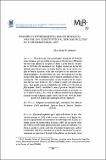| dc.description.abstract |
This article argues that internal affairs (namely, the 1994 EZLN armed indigenous uprising and the rise to power of the right-wing PAN party) had much more influence on the reform of Article 2 of the Mexican Constitu- tion in 2001 than did international law. In effect, it points out the fact that although international treaties are legally binding, they do not always have effect on domestic legislation, as the latter may ignore or even contravene inter- national regulations. In practical terms, this means that international law does not necessarily impact amendments made to national constitutions and laws. In reviewing the 2001 constitutional reform, we come to realize that this amend- ment had two major drawbacks. First, it failed to comply with international norms, since specific provisions established in the CBD and C169 were not fully respected. Second, it established a series of provisions that fail to allow indigenous peoples to fully exercise their environmental rights (in particular, ac- cess to natural resources). As a result, the Mexican authorities never adequately responded to many indigenous peoples’ claims based on the 1996 San Andrés Accords and Cocopa Law agreed upon with the Zapatistas. |

